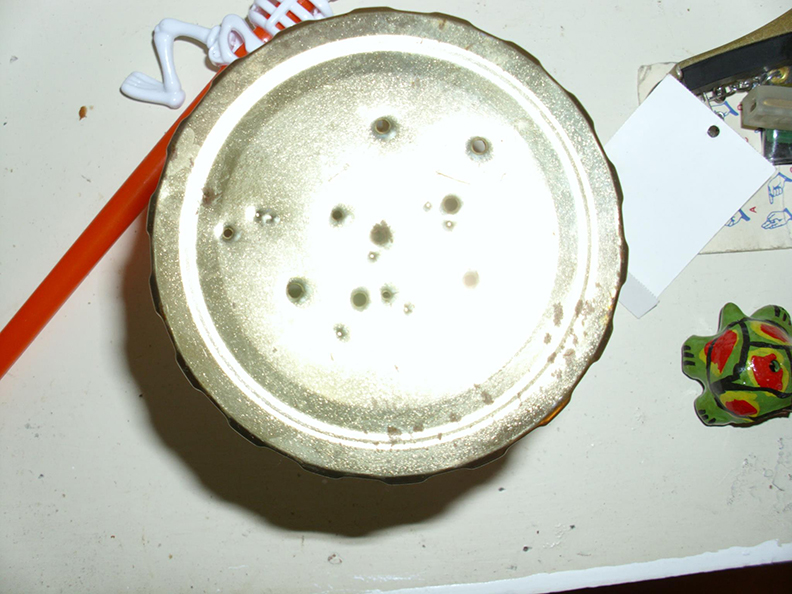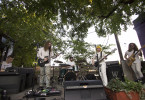Sun Riah
Firefly Night Light
(Self-Released)
A-
Oklahoma’s flirtatious approach to experimental music isn’t anything new. For whatever reason, the Great Plains have been friendly confines for oddball psych-pop over the last several decades, beginning with the early-’80s noise-punk scene that spawned The Flaming Lips and Chainsaw Kittens and manifesting most recently with Evangelicals and the current litany of emerging young DIY artists.
Despite its abundant (and nationally underrated) experimental output, the region has yet to see an artist like Sun Riah. The brainchild of OKC-based songwriter M. Bailey Stephenson — who also performs in ethereal local collective King Mary — Sun Riah’s freeform, harp-based compositions and emotive vocal style serve as resounding dissent to the conventional musical wisdom that has otherwise defined the region. But to reduce her music to a mix of weird noises and nontraditional instrumentation would be imprudent. What makes Sun Riah — and her tremendously beautiful and affecting debut full-length, Firefly Night Light — so exceptional is the way in which she marries experimental elements with vulnerability, devastation, and resplendently harrowing melody.
On last year’s …, the Musical — one of the most quaintly opulent Oklahoma-based surprises of the last few years — Stephenson displayed a courage and sincerity that few outside of John Moreland have been willing or able to articulate. In this same lyrical vein, Firefly Night Light culls its inspiration from within: “Prayers once begged for future dreams, innocent things / Now prayers are some desperate plea for pardon,” Stephenson sings on the stirringly sparse “Madame Melancholy (Part 2).” Yet the vulnerability exhibited here isn’t of the powerless variety. There are moments — like those in “All Fell” (“And now I stand much taller than I did with you”) and “Forget-Me-Nots” (“Forgive me not but I cannot change”) — when Stephenson seems poised to conquer her inner demons, only to flounder in her search for a means. Her words emit a supreme candor, but exist behind a veil just thick enough to offer ambiguity and intrigue.
As poignant as her lyrics can be, Stephenson’s greatest maturation is in her compositional restraint. At 14 songs and 52 minutes, Firefly Night Light has ample room for her capricious arrangements to breathe, thus affording opportunities for melodies to evolve organically and atmospherics to take hold. Nowhere is this as evident as on the enthralling “Talia N’ D,” where looping vocal effects support a hook that grows steadily but subtly in intensity as the song progresses. “Ice Cream Bones,” meanwhile, features arguably the album’s most accessibly pleasant melody and Stephenson’s most piercing vocal performance, but is supported by ghoulish drones that cloak the song in mystique. Engineered by Chris Harris (an occasional Oxford Karma contributor, full disclosure) at the now-defunct Hook Echo Sound, the entire album sounds incredible. Whereas …, the Musical was charming in its lo-fi sensibilities, Firefly Night Light is far more sonically immersive, and what was initially a welcome complement to Stephenson’s songwriting is now an essential element of it.
As the record draws to a close with the cripplingly winsome “Firefly Night Light, My Heart,” an overwhelming stream of elusive, rarified beauty is suddenly within aural grasp. (“Firefly night light, my heart / Guide me through this dark with your glow / I know I’ll find my way home”). Reminiscent of Joanna Newsom’s “Clam, Crab, Cockle, Cowrie” (and not just because of the harp), the song puts an emotionally wrenching exclamation point on an already brooding collection of songs. A jarring combination of passion, curiosity, and potential realized, Firefly Night Light is a landmark album for Oklahoma music, marking the arrival of a young and gifted songwriter who, in all likelihood, has yet to catch a glimpse of her ceiling. Hopefully, if the mid-2010s are someday remembered as Oklahoma’s musical reawakening, Firefly will have served as a guiding light.





